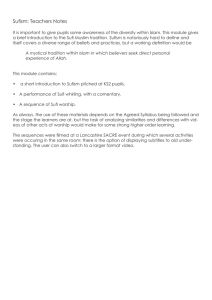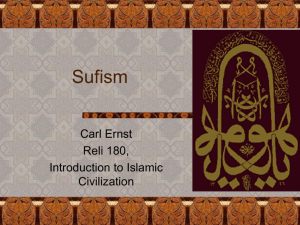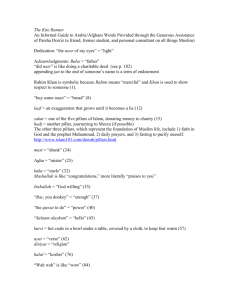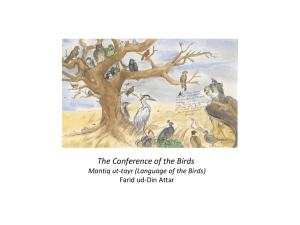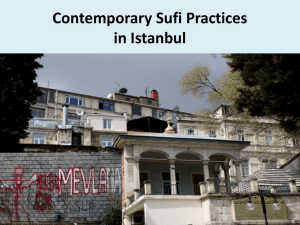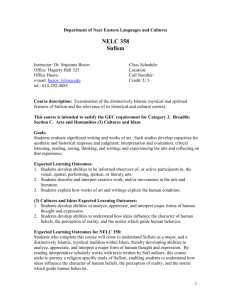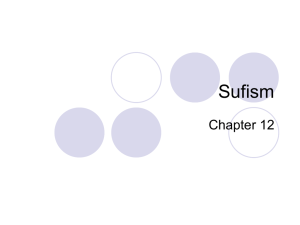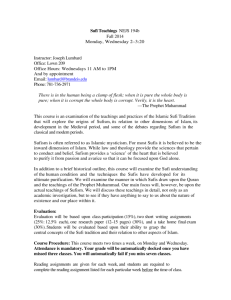Toward Global Community: Sufism and World Order Email:
advertisement
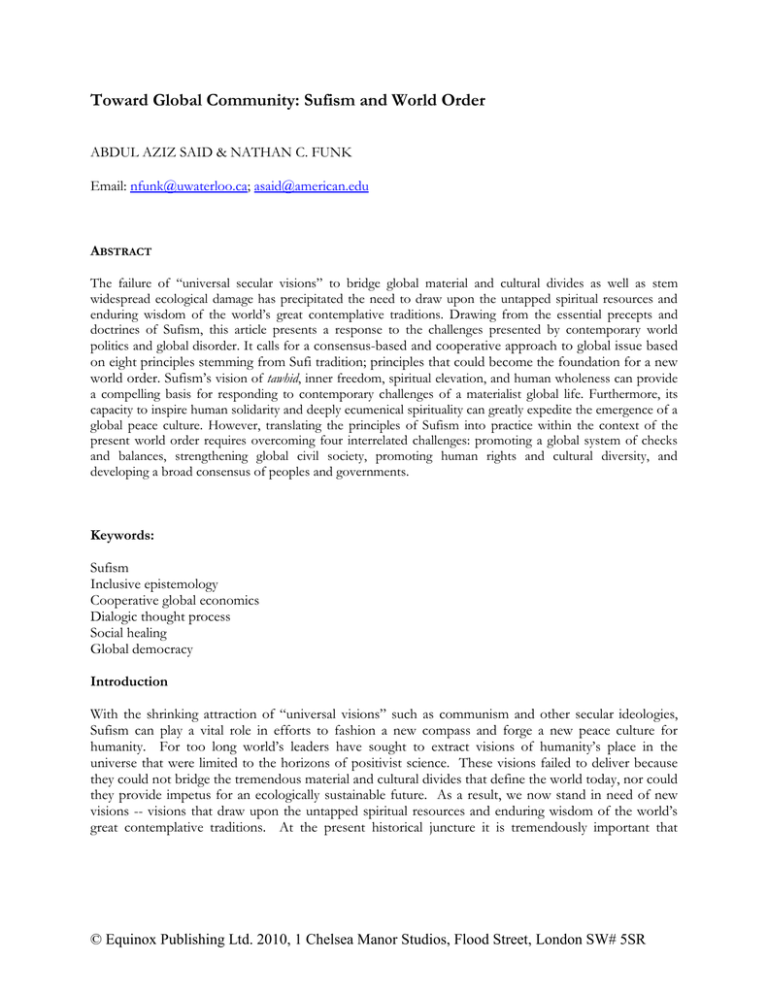
Toward Global Community: Sufism and World Order ABDUL AZIZ SAID & NATHAN C. FUNK Email: nfunk@uwaterloo.ca; asaid@american.edu ABSTRACT The failure of “universal secular visions” to bridge global material and cultural divides as well as stem widespread ecological damage has precipitated the need to draw upon the untapped spiritual resources and enduring wisdom of the world‟s great contemplative traditions. Drawing from the essential precepts and doctrines of Sufism, this article presents a response to the challenges presented by contemporary world politics and global disorder. It calls for a consensus-based and cooperative approach to global issue based on eight principles stemming from Sufi tradition; principles that could become the foundation for a new world order. Sufism‟s vision of tawhid, inner freedom, spiritual elevation, and human wholeness can provide a compelling basis for responding to contemporary challenges of a materialist global life. Furthermore, its capacity to inspire human solidarity and deeply ecumenical spirituality can greatly expedite the emergence of a global peace culture. However, translating the principles of Sufism into practice within the context of the present world order requires overcoming four interrelated challenges: promoting a global system of checks and balances, strengthening global civil society, promoting human rights and cultural diversity, and developing a broad consensus of peoples and governments. Keywords: Sufism Inclusive epistemology Cooperative global economics Dialogic thought process Social healing Global democracy Introduction With the shrinking attraction of “universal visions” such as communism and other secular ideologies, Sufism can play a vital role in efforts to fashion a new compass and forge a new peace culture for humanity. For too long world‟s leaders have sought to extract visions of humanity‟s place in the universe that were limited to the horizons of positivist science. These visions failed to deliver because they could not bridge the tremendous material and cultural divides that define the world today, nor could they provide impetus for an ecologically sustainable future. As a result, we now stand in need of new visions -- visions that draw upon the untapped spiritual resources and enduring wisdom of the world‟s great contemplative traditions. At the present historical juncture it is tremendously important that © Equinox Publishing Ltd. 2010, 1 Chelsea Manor Studios, Flood Street, London SW# 5SR Toward Global Community: Sufism and World Order 2 exponents of faith traditions such as Sufism begin to rearticulate essential precepts in ways that respond to the contemporary context of profound human need and deep ecumenism.1 This essay outlines a Sufi response to the challenges presented by contemporary world politics. This response, which includes a call for movement towards a consensus-based and cooperative approach to global issues, is based on eight principles derived from an interpretation of the Sufi heritage: tawhid as epistemology, reinvestment of spirituality, global citizenship within cultural diversity, “beloved” global community, economics of sufficiency, development as modernization plus humanization, democracy as process not product, and social healing. It is our hope that the principles and priorities suggested below will stimulate inspired discussions around the following questions: What does Sufism tell us about world order? What are the normative and practical implications of Sufism‟s vision of tawhid (unity)? Tawhid as Epistemology It is fitting that we begin our discussion of Sufism and global politics with tawhid, a fundamental Islamic theological precept that has been understood by Sufis as a “unity of being” (wahdat al-wujud). We must start with this most essential basis of the Sufi vision and methodology, and then proceed to its existential implications. Through the testimony of such exemplars as Ibn „Arabi, Sufism has developed the view that all being is one, and that the purpose of human life is to know this unity existentially – that is, in the midst of action, experience and spiritual practice – and not merely to seek distinction or salvation as an individual. Sufism challenges us to discover and live the principle of tawhid as direct personal experience of Reality – as the grasping of our relation to the absolute, and as the maintenance of harmony with the universe (see Coates 2002; Izutsu 1983). It challenges us to discover that human consciousness comprises both analytic and intuitive modes, and to see the individual parts of reality as well as the whole of it. It regards the complementary functioning of the rational and the intuitive is a measure of human creativity. When we reconcile the two, we come to terms with ourselves as whole beings. Invoking the unity of existence as suggested by tawhid does not deny the apparent existence of a multiplicity of created things. As Ibn „Arabi has affirmed, tawhid refers us to the overall harmony and patterning of the universe. It is natural law in the broadest possible sense: each individual person has a unique place and special obligation to act in support of this patterning. Sufism proposes that knowledge in the complete sense is transformative knowledge of the unity of existence – of unity between subject and object. Doubt remains as long as the object seems different from the knowing subject. Normally we do not feel this relation between knower and known, or recognize that in a deep and profound sense we are what we perceive or see. Yet knowledge is relational. Ibn „Arabi defined knowledge as perceiving and being that which is. Really to know – to realize that we already are whatever we perceive – is to be deeply changed. The purpose of real knowing, therefore, is transformation – becoming free from illusions, especially the illusion of separateness. 1 Sufism has been defined in many ways, with some authorities seeking doctrinal common denominators and others emphasizing the principle of spiritual universalism. This paper understands Sufism as a non-sectarian, inclusive contemplative tradition that has been nurtured within the context of Islamic mysticism and spiritual culture. The interpretations offered in this paper reflect the authors‟ best efforts to relate historically manifested Sufi ideals to the challenges of our contemporary global reality. © Equinox Publishing Ltd. 2010 Abdul Aziz Said & Nathan C. Funk 3 The naïve materialism of the post-Renaissance centuries is no longer working, and must be replaced by a more inclusive epistemology. The deeper we delve into the fundamentals of science, the closer we are to the fundamentals of many of the traditional mysticisms. Sufism enables us to assimilate these insights, and to pursue education and transformation in a free spirit using various methods, combining both linear and intuitive modes of consciousness. We recognize our oneness in a way that radically alters our way of being in the world. We realize that the most profound knowledge comes from personal integration, which in itself offers a template for integration of humanity at the species level. We begin to value the self as a whole, embracing the unconscious mind as well as the conscious. Sufism allows us to dismiss the idea that scientific empiricism should be enshrined as a substitute for religion, while simultaneously affirming that traditional approaches to spirituality do not need to be “sheltered” from the pursuit of scientific knowledge about human consciousness. Rather, these ways of knowing can coexist, informing each other to produce new insights about human interdependence at the material and social as well as spiritual levels. At the deepest level, we are and always have been one. The divine manifests through the material, and the material exists within the context of the divine. The whole is reflected in the parts, and from parts we reconstruct the whole. Reinvestment of Spirituality Sufism provides compelling testimony to the fact that everything in the universe and in human nature is not fully accessible to positivist science. Many aspects of our inner reality and life, including consciousness itself, remain mysterious. One of the most characteristic and mysterious features of the inner life – a feature about which Sufism speaks quite articulately – is the age-old quest of the human spirit toward transcendence, the act of reaching toward an ultimate reality. From a Sufi perspective there is a profound need to reestablish this quest as the foundation of human striving – that is, to reinvest spirituality in our collective undertakings. Throughout history, though admittedly for limited periods, various civilizations have demonstrated how spiritual values can engender social progress. At the same time, we would hasten to acknowledge that spiritual values have just as often been corrupted and manipulated to justify actions that represent their antithesis. This in itself, however, should not prevent an appreciation of the historic association between the emergence of just social orders and widespread commitment to spiritual values. Sufism enjoins humanization of the sacred and consecration of the human. The humanization of the sacred means the destruction of idols so that the Reality may live and be known in human life. The consecration of the human means the recognition that sacred activity is not apart from the immediate, the personal, and the interpersonal. We experience the reinvestment of the sacred in our daily lives. Sufism recognizes that spirituality starts with the individual, with our very essence. At the same time, Sufism sees politics as inherently spiritual because our public life reflects our social values. The reconnection of politics to our highest and most worthy values is now the most important task in political life. Even as Sufism allows us to see the world as a single, integrated whole, it also challenges us to perceive that our world is painfully fragmented. There is great suffering, much of which comes from failure to perceive and affirm the reality of our interdependence. Spirituality provides the possibility of experiencing and accepting human solidarity, and most importantly, the wholeness of human life. It is an experience of a sense of unity that overcomes the principle that divides humanity on the basis of religions, genders, and classes. Global Citizenship within Cultural Diversity © Equinox Publishing Ltd. 2010 4 Toward Global Community: Sufism and World Order Sufis have long recognized that cultures are not and never have been monolithic, and have provided powerful examples of how carriers of different cultures can coexist without violent conflict. Contrary to the theses of Samuel Huntington and his counterparts in non-Western contexts, cultural diversity is not a security threat. It is the reality of our world, and we need to learn to work with it more effectively. Cultural differences are not only obstacles to understanding; different cultures bear within themselves resources for grappling with fundamental problems of human existence. When we regard culture as a resource rather than as a threat, we begin to change the way we relate to our own traditions and to those of others. Our authenticity ceases to depend on replication of past forms and exclusion of outsiders. We become more comfortable with our own distinctiveness, and simultaneously more capable of recognizing the genuine uniqueness of others. We recognize that the whole world needs the whole world – to survive and to become more human. In our contemporary world there is an increasing need for some kind of minimal global bonding culture to facilitate the creation of a working, global consensus to address the most critical global issues. Without an ethos of global citizenship that embraces the idea of unity in diversity, we will be unable to work with one another to address these issues, and will deprive ourselves of invaluable resources. Many of the reasons that Western and non-Western intellectuals experience discomfort with cultural diversity are epistemological. Because the inelasticity in our traditional ways of seeing and knowing the world is precipitating a global crisis of identity, we need new, synthetic approaches to education that permit us to experience ourselves as global citizens. The global citizen should access “knowing” as a mode of multi-perspectival consciousness. Education should expand the boundaries of awareness, and open new horizons to individuals in their search for truth, beauty and order. Knowledge should liberate us from our presumptions and illusions. It should liberate our creativity to interact with the magnificent diversity and vibrancy of the many ways of knowing developed by different civilizations. It should enable us to harmonize multiple religious, social and national identities. It should help us to discover that the incommensurable insights of different knowledge systems may be complementary rather than contradictory. The coexistence that global citizenship strives for is predicated upon pluralism. The pluralism necessary to create global citizens should reflect the natural progression of humanistic ethics. Different linguistic, ethnic, cultural, and national entities are all valuable. They flower in unique spaces and manners, whose richness is only understood in juxtaposition with the whole. Cultural diversity creates intellectual possibility. In history, wherever a conscious decision was undertaken to integrate the many forms of knowing, a cultural renaissance has emerged. A dark age for the Western world was ended by a golden age for the Islamic world. In Andalusia, the coexistence of Muslim, Jew, and Christian made it the intellectual capital of the medieval world (Menocal 2002). The Abbassid capital of Baghdad in the Tenth Century comprised one of the most cosmopolitian cities ever known where Jewish, Muslim and Christian scholars searched for truth in harmony. It is eminently possible to create, restructure and redevelop the realm of education so that each human being can achieve self-awareness within a global context. Through creative approaches to education, students can move towards a global context of perception and citizenship without sacrificing their own sense of cultural dignity and identity. Recognizing the presence of truth in every language requires study and a reconsideration of received assumptions, but it need not mean ceasing to speak one‟s own native tongue. Global citizens must walk a tightrope, balancing past with present. They preserve the values and accomplishments of the past while creating new the possibilities for the future. © Equinox Publishing Ltd. 2010 Abdul Aziz Said & Nathan C. Funk 5 Sufism affirms that spirituality often transcends the socially-defined boundaries of religion. Our inner essence abides with our Creator, and is the basis for our broadest and most inclusive involvement with the human prospect. In this respect it is worth noting Sufism‟s historically ambivalent relationship to dogmatic theology. Though most Sufis respected institutionalized frameworks, they radicalized Islam‟s rejection of idolatry to include even excessive ideological attachment to their own beliefs about God and divine will. They used form as a vehicle, never as an end in itself. Moreover, Sufis saw no reason to believe that the circle of divine providence excluded non-Muslims. Sufism sees culture as a resource whose function is to express our humanity in ways that make us more human. Cultural creation is essentially a communal process in which freedom in achieved through collaboration, rather than through a purely liberal and individualistic “doing of one‟s own thing.” The communal nature of human creativity involves a certain amount of discipline, self-restraint, and selfsacrifice. Simultaneously, Sufism sees cultural pluralism and freedom of expression as the basis of existence. Each impassioned mind and informed heart is a powerful source of transformation. Each one of us can participate in the creation of harmonious global institutions and the restructuring of existing ones. Each person can help to transform cultural conflict by reframing value polarities as value complementarities. “Beloved” Global Community The globalization process is irreversible. Nonetheless, it is not clear whether the world is coming together or falling apart. Unless we are able to foster a new sense of global community, the concurrence of globalization and privatization on a world level may leave us in a desperate and chaotic situation that aggravates ethnic and religious conflicts. The existing international system favors the rich who are getting richer and the powerful who are getting more powerful. The resultant maldistribution of wealth and power is itself a form of disorder. We are confronted with bitter paradoxes: Our world has never been richer than it is today, but the scope and intensity of poverty is also unprecedented. The peoples of the world have never been closer together – and yet they have never been farther apart. Thus, Rosenau‟s notion of fragmegration in this special issue is an especially appropriate description of this state of affairs. Despite these grave problems with globalization, we should not ask how to reverse it. Simply put, there is no possibility of de-globalization, although one should not rule out the search for alternatives to ill effects of the globalization phenomenon. In fact, we must ask how we can reshape and redirect globalization. How can we establish institutions and a process of world governance to accommodate both the universalizing and the localizing effects of globalization? How can we deal with the issues of massive inequality, unfair distribution of benefits, and marginalization of tradition and culture? How can we create a sense of global community that gives coherence, meaning, and purpose to our emergent reality of functional interdependence? With guidance from spiritual traditions such as Sufism, our era could become a prelude for one of the most creative and harmonious epochs in human history. Preparation for the journey toward a world community begins with seemingly irrelevant dreams. Dreams are imperfect and subject to contextual, cultural, and historical biases. Yet they open the way for a future in which we can shield ourselves from the disaster of chaos, take steps towards the alleviation of human misery, reduce the burden of the world arms race, and decrease the burden of repression on hundreds of millions of people. © Equinox Publishing Ltd. 2010 Toward Global Community: Sufism and World Order 6 Sufism leads to a profoundly healing vision of cooperative global politics. Developed and developing worlds – North and South – become one world. Oppressor and oppressed become people experiencing life in all its vicissitudes. Civilization and barbarism become culture. We learn that there are no developed or less developed states, only individuals and societies in development. The Sufi community is a global community, and the global community is a beloved community.2 From a Sufi perspective, this global community is possible because all of humankind (insan) is ultimately one people – a single community that transcends creed, caste, class, country, and color. Every human community has received streams of divine truth and revelation. Each civilization has a unique contribution to make to the human prospect, and every culture is intrinsically valuable. Moreover, each culture can benefit from contact and exchange with other cultures: the whole world needs the whole world. Global community means unity in diversity. In nature as well as in culture, Sufism sees diversity as a form of divine blessing or baraka. The whole is reflected in the parts, and “Wheresoever you turn is the face of God” (The Holy Qur’an, 2:115). Rather than prejudice, Sufism calls for attitudes of humility and deep respect. Every individual and every nation or culture is capable of manifesting divine qualities. No individual or community can believe itself to be uniquely privileged or unconditionally favored. Economics of Sufficiency Sufism tells us that inner commitment to a vision of humankind‟s place in the universe which gives priority to ethical thought and values over mere physical existence is a fundamental prerequisite for survival and, ultimately, prosperity on this planet. To this end, Sufism prescribes a cooperative global economics based on love, sacrifice, and cooperation, supporting individual and communal self-reliance, a fair distribution of the earth‟s limited resources, and care for the planet. A cooperative global economy emphasizes sufficiency rather than scarcity. The goal is to produce enough of the right goods rather than as much as possible of everything that can be marketed. The purpose of production is to provide everyone with enough to serve as the basis for approaching the nonmaterial aspects of human life. Human capacities, strengths, motivations, and attitudes become primary economic resources and the foundation of development. Sufi epistemology seeks to expand our vision by placing positivist thought-forms in a broader context that permits creativity. These thought-forms, which are modeled on Aristotelian logic and linear thinking, have limited our capacity to understand complex dynamics of the world we live in. We complicate problems of world politics when we are unable to perceive context and long-range consequences. The natural, biological systems and global social interactions that constitute our world are always more complicated and circuitous than our ideas about them. Using lineal, cause-and-effect thinking to map a world that is an interconnected, interdependent network of feedback circuits inevitably leads to inappropriate actions that generate unanticipated results. Rather than perceiving the world as a home within which we reside, we “think the world apart” through abstractions that fragment knowledge and encourage damaging relationships to nature and society. 2 Aspiration toward a “beloved community” was a keynote of Martin Luther King‟s activism during the American civil rights movement. © Equinox Publishing Ltd. 2010 Abdul Aziz Said & Nathan C. Funk 7 It becomes difficult to build a just, stable and sustainable peace when we think that ecological values are somehow in conflict with economic values, and that we are faced with an either/or choice between taking care of our environment versus taking care of people. This is exactly what happens, however, when we attribute too much concreteness and autonomy to abstract concepts. Closer reflection on the words “ecology” and “economy” reveals that they share a common Greek meaning: “study of the house.” They refer to housekeeping. The physiology of the human body, the complexities of family life, the network of global trade, and the infinitely varied and delicate interdependencies of the totality of life of earth – all are alike in structure. Aristotelian logic would treat these structures as distinct, and perhaps even consign them to different departments of the university. In contrast, a Sufi perspective would provide greater scope for a maieutic (dialogical, or Socratic) thought process that would bring them together and probe their connections and interdependencies (Fortunoff 1998). It would help us to discover that sufficiency and not scarcity is the true condition of human life on the planet. There is enough for everyone, provided that we accept standards of discernment and justice, supplanting frantic accumulation with a search for means of satisfying deeper and more enduring human needs. An economics of sufficiency can greatly mitigate international conflicts, while also transforming relations with the natural world. From a Sufi perspective, the human being has a profound responsibility of custodianship (khilafah) vis-à-vis the natural world. The environment is a manifestation of the divine. Love of nature and person are therefore equal in the heart of the Sufi. Existence is the grand mosque of nature where there is a place for every root under its grounds, and for everything under its skies. Development as Modernization Plus Humanization Sufism leads us to a view of development as an historical process through which we change and create a humanist and creative future within the context of our environment. Development becomes a process for the evolution of our basic strengths. Individual and societal growth becomes one; each one of us is a part of this open-ended process. Development is self-conscious, participatory, self-managed, cooperative, and seeks the full humanization of the person. True development occurs when we recognize that the material and the spiritual are united, and cannot be separate and independent. When we blend the materialism of the West and the spirituality of the East, we cause both elements to “meet and fuse.” The most highly developed being is neither Western nor Eastern, but rather a whole person who partakes of the finer qualities of both the Western genius and the Eastern prophet. This fusion of East and West is a metaphor for the new person who is the global citizen. Emphasizing the value of cultural diversity and the importance of global citizenship changes the way we think about development. It is not tenable theoretically to extrapolate from the experience of industrial societies in formulating proposals for the guidance and transformation of non-Western societies. Neither is it acceptable to presume that experts from Northern countries should dictate to the peoples of the Global South. We need to separate the idea that the West has learned something of value about development from the idea that the West embodies development and is therefore on the cutting edge in all domains of human progress. Insofar as the West has something to teach the East about techniques of modernization, the East also has much to offer the West with respect to non-material values. From a Sufi standpoint, there are no underdeveloped or developed nations. All nations are in various stages of development, with © Equinox Publishing Ltd. 2010 8 Toward Global Community: Sufism and World Order respect to different value criteria and indices. The larger international system is extremely underdeveloped, characterized more by the rule of force than by the force of rules or of consensus. There is an important distinction between modernization and development. The development process is the way in which society and its members seek to reach their potential. It is a process with a goal – even if this goal is perceived as an ever-receding one. Implicit in all development models is a desired state or implied utopia that has been extracted from the cultural experience of a people and generalized into a vision of the desired society. Because cultural experiences change, it is natural that the “utopia ideal” behind development models changes as well, leading to new conceptions of development and new indicators. In contrast, modernization is the adoption of modern technologies for the use of society. Modernization attempts to make a society more rational, efficient, and predictable, especially through the use of comprehensive planning, rational administration, and scientific evolution. Modernization also carries the connotation of a more productive society, at least in economic terms. Like development, modernization is always at least a partially conscious effort on the part of a minority that has a vision of what a modern society should look like. The vitality of visions of development can only be derived from the cultural realities of a given society. The increasing cultural pluralism and persistent inequality within contemporary societies only underscores the importance of political participation and social justice as elements of development processes that bring dignity, combining modernization with humanization. The dialogue about development that is necessary within societies is also increasingly needed on a transnational basis as the world economy becomes more tightly integrated in the absence of participatory processes of global governance. Democracy as Process Not Product Sufism provides a basis for redefining democracy in spiritual terms, and framing it as a global process or reorganizing political behavior. To become more democratic, each person and culture must sweat out their own growth. At the same time, they must coordinate and cooperate with other persons and cultures, evolving common standards without imposition or cultural imperialism. Democracy is not a western product. Like development, democracy must be deeply rooted in the dreams and hopes of the great majority of a nation to flourish. We frequently tend to conflate Western liberal forms of democracy with the substance of democracy. The substance of democracy is a human society that has a sense of common goals, a sense of community, a process of participation in decision-making, and protective safeguards for dissenters. The form of democracy, on the other hand, is always cast in the mold of the culture of a people. The practice of democracy is always less tidy than its definition, because it is more dynamic than its formal description and prescription. Western democracies emerged after years of deep introspection, existential anxiety and conflict, with hard-won lessons and achievements in the realm of political coexistence. Non-Westerners are not required to reach the same conclusions as Westerners, and are more likely to develop their own authentic bases for political empowerment. Protagonists of democracy must ask themselves: What kind of citizens can their societies create, animated by indigenous values and visions? What kinds of solution frameworks can support participatory decision-making? What values and social mechanisms can ameliorate the poor conditions of modern, urban living? © Equinox Publishing Ltd. 2010 Abdul Aziz Said & Nathan C. Funk 9 Today we face a delicate task: There is a need for new beginnings on the road to global democracy. Here is an opportunity to engage in substantive dialogues that seek to overcome years of repressed political conflict. If dialogue about democracy can begin to extend beyond elites, we will witness not only a transformation in historical relationships and understandings, but also the emergence of true leadership that thrives through the flourishing of others. Such leadership is “strong” because it applies deeply rooted social values in creative ways that are good and beneficial for the community. Such leadership is “powerful” because it chooses to empower others rather than take power away from them. Social Healing Forgiveness and reconciliation are keynotes of the Sufi approach to world politics. Sufism works for brotherhood, sisterhood, tolerance, and inclusiveness, and to this end it seeks social healing and eschews revenge. Sufi confidence concerning divine justice in no way precludes effort to right wrongs, but it does entail an understanding that those who sow bitter fruit will ultimately taste it. The most constructive way for the Sufi to contribute to the manifestation of a better world is to seek transformation. Sufis appreciate that the world community is now threatened by the very mechanisms which, in the past, have served us well. Until recently, the dual standard of morality which operated within and among groups served a positive value. The competition among states and cultural groups formed a frame of reference for a humanity that lived out its collective life within fragments of the whole. So long as we lived in a flat world, infinite in extent, groups in conflict could move on whenever they lost out in some competitive encounter over resources or power. But now we have run out of room, and the consequences of resentment and violence are much more severe. The competitive mechanisms and double standards of the past cannot serve us well in a finite, spherical, shrinking world. We have moved into a new context for humanity as a whole. We must be committed to a world that works for everyone, and that excludes no human group from its moral imagination. We must become committed to the hard work of forgiveness and reconciliation. Sufism reminds us that reconciliation begins with our own inner life. Just as we seek to reconcile the disparate aspects of our own personalities – reason and passion, spirit and matter – so too do we aspire to reconcile the many voices of truth as they manifest within societies and cultures. The Sufi approach to politics requires effort to learn the many faces of humanity, and to see the essence unfolded in each person. It enables us to see that the oppressor and oppressed are both human beings experiencing life in all its vicissitudes. It helps us to perceive that reason and intuition are two faces of truth, and that planning and spontaneity are equally valid and complementary ways of fulfilling our human potential. Rather than seeing civilization and barbarism we see culture. Propositional knowledge and anecdotal knowledge become twin roots of human knowledge. Perceiving harmony and potential complementarities amid great cultural diversity is an exercise in awareness; something which can be found in other contemplative traditions, like the Baha‟i Faith, as explained in this special issue by Roshan Danesh. This awareness reflects the progression of the individual‟s search to know human wholeness as described by the many wisdom traditions of the world. It comes from acknowledging and accepting basic differences in world-view among different peoples. Acknowledgment of differences is appreciation, honoring the unique experience of each individual, citizen, believer, and civilization. This appreciation gains its wholeness through empathy. Once we are able through education constantly to shift subject and object, agent and structure in our dialogic analysis, we begin to experience the history of the other as our own, without judgment and without hate. In © Equinox Publishing Ltd. 2010 10 Order Toward Global Community: Sufism and World recognizing the authentic individuality of others, we truly begin to understand our own unique contribution to the world, the part our own identity plays in the global mosaic of beliefs. Conclusion Sufism‟s vision of inner freedom, spiritual elevation, and human wholeness can provide a compelling basis for responding to contemporary challenges of global life, helping us discern pathways toward cooperative global politics. As we translate principle into practice within the context of the present world order, four interrelated challenges emerge. First, we must seek to promote a global system of checks and balances, i.e. a global balance of power. The global balance of power should not be based upon military power and economic leverage as has been the dominant practice in the past. A viable global balance of power cannot be status quo-oriented; it has to possess anticipatory insight and become open to broader participation. The marginalized people of the world must be empowered, so they can also be part of the global balance of power. Second, we need to strengthen global civil society. One worlders, environmentalists, developmentalists, and advocates of human rights and democracy need to continue expanding the global civil society of transnational nongovernmental organizations (NGOs). They need to fashion an agenda that is truly global. Third, we need to align human rights principles with their contemporary context of application. Particular emphasis must be given to cultural diversity. We need more of the world‟s countries to become living laboratories of multiculturalism, to provide us with a new vision of core values associated with diversity. We also need to focus our energies on the greatest and most widespread violation of human rights today: poverty. The fourth challenge is the creation and development of a broad consensus of peoples and governments. Consensus – the distinctive political tool in relations among equals – must replace armed force as the preferred instrument of national policy. “Realists” may object to the naiveté, the instability, or the shortsightedness of some manifestations of consensus, but it would be sheer folly to challenge either its existence or its power. The process of consensus is so new as a method of reaching binding international decisions that mistakes and contradictions in its application are inevitable. But we have little choice: the emerging global order will either learn to live with mass opinion or it will not survive. Let us expand upon this final point. Consensus does not demand a radical transformation of the global system. Negotiation, persuasion and accommodation will remain as standard features of interstate life. The loss of the ability to force a verdict by war will do little more than impose one more limitation on the practice of statecraft – a more fundamental inhibition than any the system has accepted up to this point but nevertheless one that will leave room for vigor, imagination, and skill in framing and executing national policy. Consensus introduces a cooperative model of world politics which focuses on the benefits of international stability in the global system. No country can achieve this by itself, and stable cooperation cannot be maintained without reliance on a standard of fairness. Cooperation based on fairness requires the identification and acceptance of shared objectives to be reached through cooperative efforts. Each of the potential cooperators has to expect personal benefit. There must also be a fair distribution of the benefits and the costs, together with mutual trust. Since no one party can force any of the others to © Equinox Publishing Ltd. 2010 Abdul Aziz Said & Nathan C. Funk 11 cooperate, and since each party has a selfish temptation not to cooperate, each must trust the others not to take advantage of both the opportunity and the temptation to cheat. Thus, cooperation requires mutual expectation of a willingness to sacrifice short-term self-interests for the common good. Cooperation based on fairness involves some risk, but the level of risk decreases when there is more confidence in the trustworthiness of the other. It is sometimes necessary to build a basis for trust by starting with relatively low-loss, low-risk cooperative ventures, and working up to bigger enterprises that have higher payoffs but also greater risks. Sufism has a vital and essential role to play in these efforts, in which it can harmonize relations between Islam and other great religious cultures and direct attention to issues that are of perennial importance in the moral and spiritual development of humanity. Because of its capacity to inspire human solidarity and deeply ecumenical spirituality, Sufism can greatly expedite the emergence of a global peace culture. Like other religious and spiritual traditions, however, Sufism must be reborn if it is to respond to the contemporary context of human life. Though most religious and ethical systems promote reciprocity and goodwill, their institutions and outlooks are too frequently identified with just those aspects of the past that contribute to current division and conflict. Put very simply, spiritual values for the present and future cannot be partisan; they must speak to the universal human need for transcendence, unity, and justice. Achieving a unifying global consensus as a basis of a just world order is possible. The essence of such a vision must be felt as well as rationally argued, because it involves both the head and the heart. From this perspective, a new global system requires new political and social arrangements, a new (or renewed) vision of humankind‟s existential reality and purpose, and an unrelenting effort to make the former truly reflect the latter. © Equinox Publishing Ltd. 2010 12 Order Toward Global Community: Sufism and World References Coates, Peter. 2002. Ibn ‘Arabi and Modern Thought. Oxford: Anqa Publishing. Fortunoff, David. 1998. Dialogue, Dialectic, and Maieutic: Plato‟s Dialogues as Educational Models. 20th World Congress of Philosophy, Boston. See http://www.bu.edu/wcp/Papers/Anci/AnciFort.htm (accessed 24 August 2010). Izutsu, Toshihiko. 1983. Sufism and Taoism. Berkeley, CA: University of California Press. Menocal, Maria Rosa. 2002. The Ornament of the World: How Muslims, Jews, and Christians Created a Culture of Tolerance in Medieval Spain. Boston: Little, Brown. The Holy Qur’an, 2:115. © Equinox Publishing Ltd. 2010
